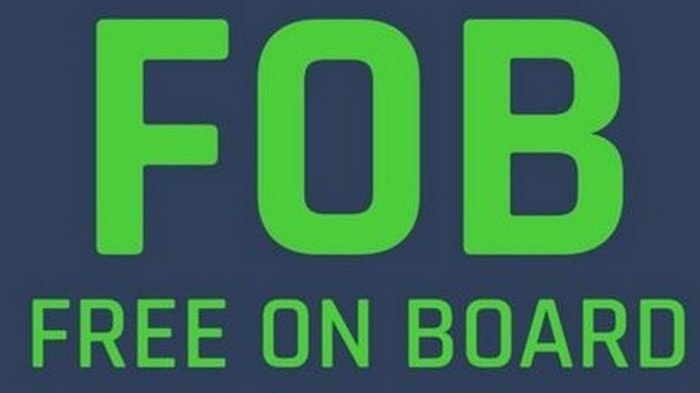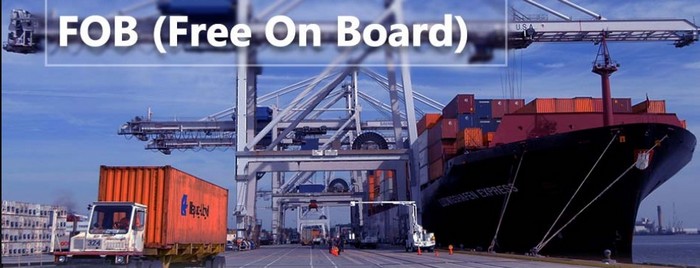Free On Board or FOB as it is commonly referred to is a trade term that signifies a seller’s commitment to delivering the promised merchandise to the destination chosen by the buyer through a particular route.
It is the place where the ownership transfers from a seller to buyer as the latter takes legal possession of goods along with its liability.
International Commercial Law is very specific about the transfer of liability from the seller to the buyer, and the term Free On Board helps to specify at what point the risk, cost and obligation shift from the seller to the buyer.
Free On Board or FOB is a contract between a buyer and a seller that indicates the shift in the risk of loss from a seller to a buyer or vice versa.
During international transportation it is important to know beforehand the place and time of delivering the goods and who will be the bearer of the risk during the journey as well as the cost of freight and insurance matter. The term FOB tells about the person who is responsible for goods that are damaged in transit.
FOB origin or FOB shipping signifies the risk carried by the buyer once the seller has shipped the goods and FOB destination is referred in case the risk is helped by the seller until the merchandise reaches the buyer.
FOB shipping point implies that it is the buyer who will pay the freight charges for shipping the goods from one place to another. As soon as the merchandise is loaded inside the freight truck, it becomes the legal responsibility of the buyer, and if anything happens to the shipment, he will be liable for the loss.
FOB destination holds the responsibility and liability of the loss by the seller during the journey. He pays shipping expenses and transfers the ownership at the delivery point to the buyer.
Table of Contents
Meaning of Free On Board
- FOB Origin Freight Collect – As soon as the freight carrier signs the bill of landing at the origin pick-up location, the buyer is responsible for freight charges and risks of transportation.
- FOB Destination, Freight Collect – The buyer is responsible for the freight charges, and the seller is in control of the goods until they are delivered.
- FOB Origin Freight Prepaid – The seller accepts responsibility for freight claims exposure and charges.
- FOB Destination, Freight Prepaid – The seller has the ownership of goods until the delivery, and he is responsible for freight charges.
Class of Free On Board
There are three main classes of FOB, and these are as follows-
- The Classic FOB – This is a contract where the buyer decides on the ship and its destination, and it is the seller who places the merchandise on the buyer’s account. The cost of marine insurance is paid by the seller but is arranged by the buyer. The bill of landing is received by the seller who later transfers it to the buyer.
- FOB Contract “with additional services” – In this type of contract, it is not necessary for the buyer to select a suitable ship for the transportation of gods. It is the seller who makes the necessary arrangement on behalf o the buyer.
- FOB Contract “buyer contracting with the carrier” or Simply FOB – In this type of contract, the buyer agrees either directly or indirectly through an agent. He decides on the ship, and the seller places the goods on the decided ship. The bill of landing is sent directly to the buyer without involving the seller.
Advantages of Free On Board contract
The numerous advantages of Free On Board contract are as follows-
- The seller knows the whereabouts of his country and can dispatch the goods properly.
- Free On Board contract ensures clearance of customs. It is the responsibility of the supplier to get the necessary clearance papers at the port under FOB. This saves time, money, complications, hassles, and unnecessary effort from the buyer.
- The buyer controls the shipping document as he is the one who selects the transport carrier and gets to keep payment documents that have been made for cargo transportation.
- If a buyer is unable to clear payment, then the seller can recover the goods before he hands it over to the buyer even if it is in transit.
- Free On Board is considered the best option if you are looking for a cost-effective shipment.
- Free On Board is a good logistic solution as it ensures safe passage and fewer costs.
- An important advantage of Free On Board or FOB is that there are no hidden extra costs in the process.
- It is accepted as a standard contract by most buyers and sellers and thus has wide acceptance.
Disadvantages of Free On Board contract
The various disadvantages of Free On Board contract are as follows
- The buyer has to suffer the risk and liability in case of damaged goods if he has signed Free On Board shipping point contract. He will bear any untoward consequences even if the goods do not reach him.
- The seller is responsible for losses if he has signed Free On Board destination.
- If the buyer does not name an effective ocean carrier, the seller will be unable to recover the price of the goods.
- In some cases, the seller adds margin costs to their Free On Board costs.
Factoring in inventory costs
The inventory cost of the buyer is affected by the shipping terms and conditions as all costs are included in inventory cost while preparing the inventory for sale.
If goods were shipped using Free On Board shipping point contract, then the buyer’s inventory cost will include the purchase price of the goods and the cost of insurance against any loss during transit.
When the buyer incurs other related costs like paying for utilities and renting a warehouse, they are also added to the inventory. A company can reduce its inventory costs by placing greater quantities and decreasing individual deliveries.
Examples of Free on Board
FOB is a standard contract that applies to most places no matter from where and to where you ship from. It defines liability, risk, responsibility, and ownership and lays out in succinct terms how far in the process the supplier will be held accountable and at what point in time the buyer will take over all of those from him.
To explain the term FOB, you need to follow an example. Suppose Linux Clothing is dealing in jackets in Australia and they have decided to ship ten thousand jackets to another company, Ramsay Clothing in the United States of America.
If the contract states FOB destination, then it is Linux Clothing who will pay for loading and shipping costs to transfer the jackets from Australia to the United States.
If something drastic happens on the way, it is Linux Clothing that is at risk and will be liable to pay because it is the owner of goods in transit.
In case the contract states FOB shipping point then it is Ramsay Clothing that will be liable to pay for any damages as it will be the bearer of any risk during transit.
Suppose ABC Company sent one thousand laptops to XYZ Company with a contract stating FOB destination. On the way, the goods met with an accident and were ruined.
It is now ABC Company that as a seller is liable and responsible for the goods damaged and will have to compensate XYZ Company but if the contract had stated FOB shipping point then the responsibility of the risk would have been transferred at the point of delivery to the buyer and the loss would have been of XYZ Company.
Liked this post? Check out the complete series on Business


